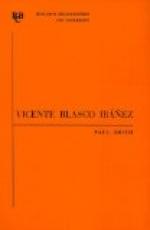|
This section contains 6,600 words (approx. 22 pages at 300 words per page) |

|
SOURCE: "The Reliable Determinants: Alcohol in Blasco Ibáñez's Valencian Works," in Ideologies and Literature, 2, 2, Fall, 1987, pp. 185-99.
In the following essay, Smith examines the means by which Blasco Ibáñez presents alcoholism as a social problem that severely afflicts the poor in his naturalistic novels Flor de Mayo, La barraca, and Cañas y borro.
Literary naturalism, through emphasis on lower social classes, drew the attention of certain nineteenth-century novelists to the presence of alcohol in the lives of the poor. Foremost among these novelists was Emile Zola (1840-1902), leading theoretician and practitioner of naturalism, who found in the lower classes an ideal subject for his materialistic approach to the study of man. The poor were far less likely than middle-class subjects to conceal their own animal nature (which for Zola constituted man's true nature) beneath a veneer of civilized social behavior. Lower-class protagonists reacted more spontaneously...
|
This section contains 6,600 words (approx. 22 pages at 300 words per page) |

|


